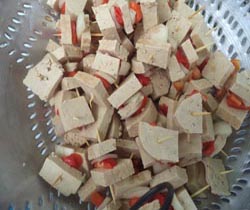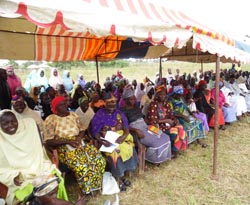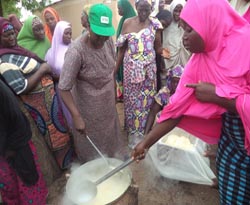In 2015 all partners and households engaged in N2Africa activities paid deliberate attention to address gender inequity in Borno State, Nigeria. Training of women on processing and utilization of soyabean was thought to be a important way to do this. The objectives of the training were to sensitize the women on the nutritional value of soyabean, build their capacity on soyabean processing and utilization into various products, empower the women economically through soyabean processing at micro level for income generation and to create awareness on the effect of nutrition on infant and young child as well as on infections and diseases. The training events attracted 660 women. Among the attendants were women soyabean farmers, women members of community based organizations (CBOs), wives of CBO members as well as non-members within the communities. Although the training was designed for women, men were also interested. 120 men watched and observed keenly how the processing went, and at the end took part in the tasting of the processed products.
 |
Top left: Soya stick meat Top right: Hundreds of women participated in the soyabean processing training |
 |
 |
Bottom left: Soya akara Bottom right: Women prepare soyabean food products |
 |
Recipes for soya milk, soya cheese, soya stick meat, soya scramble, soya akara, tom brown and vegetable soup were developed through practical demonstration during the training. Participant’s opinions at the training and on the products processed were very impressive. They all appreciated the management of IITA and N2Africa for providing them with such training at the right time to their communities. They also promised to extend such training to other surrounding communities that were not reached by N2Africa to help improve the health status of those communities.
Extracted from the Borno State Annual report 2015 by Greta van den Brand and approved by Nkeki Kamai

